Theologians talk about a prevenient grace that precedes grace itself and allows us to accept it. I think there must also be a prevenient courage that allows us to be brave – that is, to acknowledge that there is more beauty than our eyes can bear, that precious things have been put into our hands and to do nothing to honor them is to do great harm. …This courage allows us… to make ourselves useful. It allows us to be generous, which is another way of saying exactly the same thing.
-Marilynne Robinson
To affirm that men and women are persons and as persons should be free, and yet to do nothing tangible to make this affirmation a reality, is a farce.
– Paulo Friere
If you can’t feed a hundred people, then just feed one.
-MotherTheresa
In addition to being National Bike Month, Mother’s Day, Beltane and so many other things, May celebrated World Fair Trade Day (May 16th). This blog’s been live since January of this year and strangely, I’ve managed to not mention Fair Trade…not once.
You’ve maybe noticed of late, the Fair Trade movement has been getting a lot of air time. Certifying agencies are at odds with one another, struggling with the impact-and-scale quandary:
“If we go BIG, the standards will be diluted, we’ll surrender to the sub-standard norms accepted across a flattened, global economy,” versus, “If we DON’T go big, we will never attain the scale required for this movement to have world-changing impact.”
Round, round the dilemma goes…
What do I think? I think our world is a big webby mess. And like the myriad other ecological, sustainability-related questions routinely rolling over in my head and heart, I arrive at my answer, an active response: make it personal. Sort of like theBuddhasaying, “Don’t take my word for it…,” I arrived at my commitment to support Fair Trade by exploring the concept as intimately as possible. Here’s what I mean:
5:30amfinds me most mornings in the dark and in my pajamas (how’s that for intimate?). Whether off to the Berkeley Y for a spin work-out, or mentally running through my agenda for the day, the first thing on my mind is coffee. I happen to LOVE the stuff – “nectar of the gods,” I call it – and I look forward to it pretty much every morning of my life. After a few sips, I feel a certain at-one-ment, a readiness to be with whatever presents itself in the hours ahead. My morning coffee is more than a caffeinated beverage, it’s a ritual that falls in the category I call, “ordinary/extraordinary.” It’s so mundane, it’s sacred; it’s so simple, it’s a miracle. Knowing this and not wanting to be unappreciative, I traveled to Guatemala in 2011…to make it personal.

Flor, Raniero, Lauren - Lake Atitlan 1/2011
This is Raniero, and his niece, Flor. Raniero coordinates a Fair Trade cooperative in Guatemala. His cooperative supplies parts of Europe and most of Whole Foods (Allegro coffee) with fair trade coffee beans. Upon landing in Guatemala City, Raniero and Flor drove me out to the shores of Lake Atitlan to meetMariaLuis.

Maria Luis, aside one of her many bags of coffee cherries
To find her, we scrambled up a steep, jungle-covered mountainside. It was a Saturday morning which meant Maria had the help of her sons, most of whom were adamant they would not grow up to be coffee farmers.
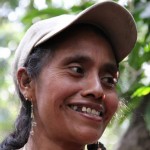
Maria Luis, aglow & storytelling
Maria Luis smiled as she told the story of her organic, fair trade coffee cherries (beans), start-to-finish. She gestured up the slope, explaining the land was hers and that she oversees a women-owned collective. In the months between the planting and harvest, she and the women cook and sell their meals for folks in town. This year, the profits from their coffee crop would be pooled to create a covered infrastructure to better support their catering business.
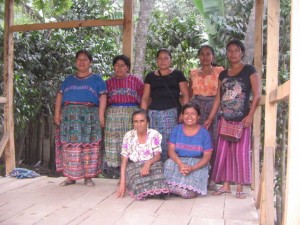
Members of Maria Luis's collective, standing in their newly-constructed catering headquarters

If coffee cherries are picked incorrectly from the plant, the stem will fail to produce next year
Caressing the coffee cherries in her basket,MariaLuisgently laughed, “my husband left a long time ago….he said he couldn’t understand me.”
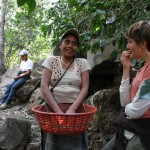
Listening, weeping
As I listened, I wept….I was so touched by her vision, by the prideshe held for her work, by the joy she exhibited in sharing her life with strangers. A cherry slipped from her basket and I scrambled to pick it up. Each one was suddenly worth a fortune! These coffee cherries – no bigger than my fingernail – were fundingMariaLuis’s sons dreams of attending college…and how many of those cherries-become-roasted-beans do I groggily grind each morning for my perfect cup of deliciousness? Never again could a bean fall to my floor and find its eternal fate beneath my refrigerator or stove: perish the thought!
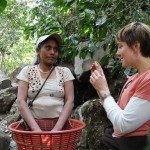
So much story in this little cherry!
Thanks to the city council, local businesses and the great volunteers from the Fair Trade Berkeley steering committee, Berkeley became the 19th Fair Trade Town in the US, in July, 201o. When I returned home from Guatemala, I thought ofMariaLuisand cringed a little each time I saw an abandoned, unfinished cup of coffee. It had become personal.
And it happened all over again on May 16th , when a few of us had the chance to celebrate World Fair Trade Day with Lata ji, a Fair Trade activist, visiting the US for the first time, from her home in Barmer, India. Thanks to the influence of Fair Trade in Lata’s village, a source of amazing textile work, girls are attending school, women are receiving vaccines and the town is funding irrigation systems to address years of drought.
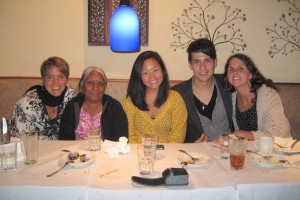
Lata ji and FT Berkeley friends
Will the certification standard changes being made by some dilute the potential of Fair Trade as its felt by the producers and their villages? Maybe…and I hope not. Will the certification standard changes increase the reach of the fair trade movement to create a game-changing impact? Maybe, I hope so, and only if more of us play.
In that ordinary/extraordinary way, may we intimately know and generously admit, “there is more beauty than our eyes can bear.” Our response needn’t be to save it all, to feed hundreds. Instead, we can honor what’s precious, and in our hands. Make it personal.

FT Berkeley Declaration Celebration, July, 2010
This was great, Lauren. I did not remember you went to Guatemala. What a great experience to intimately understand the choices we make when we buy a product. It was good you love coffee so much to give the woman a sense of how important her product was to you.
This kind of market is essential to keeping the money out of the big corporations who only exploit the regions that ruin the ecological systems not to mention the lives of individuals who will never see the profits.
Thanks for this great sharing –
Elizabeth